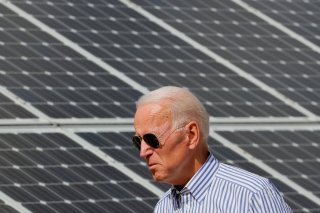Facts, Not Fear, Should Drive Biden’s Climate Change Policies
Climate change is real, but manageable. The answers to climate change lie not in extreme policy, but in free enterprise and smart mitigation strategies.
Finally, policymakers should also reject any agreements in which America makes economic, military, or strategic concessions in exchange for climate promises. Given that China has previously underreported its emissions—making it difficult to track what type of progress they may be making on emissions reductions—we cannot have confidence that China will live up to its commitments.
Policies to embrace
What should a smart U.S. climate policy look like? It should be organized around a bedrock philosophy that the cure cannot be worse than the disease. Sound climate policies that reduce the risks of climate change, ensure affordable and reliable energy supplies, and raise levels of prosperity around the world are achievable.
The United States already knows how to do this. U.S. emissions fell by 12 percent from 2005-2018, even as our economy grew 25 percent. Meanwhile, global energy-related emissions increased over that span by nearly 24 percent. Onerous regulations aren’t to thank for this improvement--private sector innovation is. Rather than drive conventional fuel prices higher, a better strategy for global decarbonization is to let the market drive down the price of green energy sources and technologies. Climate entrepreneurship will make energy, manufacturing, and agricultural practices more efficient and more climate-friendly. This will not occur on a timeline that satisfies the most ardent net-zero proponents, but policy that unleashes innovation and free enterprise is a good climate policy.
Free enterprise policies include allowing companies to deduct new capital expenses from their taxable income in the year the investments are made, thus encouraging investment in new technologies and equipment, such as HVAC systems that are cleaner and more efficient.
Smart mitigation strategies are essential, too. Even though worst-case temperature forecasts are improbable, science hasn’t completely ruled them out. Carbon capture on the ground and in the atmosphere are sound mitigation policies that reduce the costs of likely climate scenarios and continue to shrink the probability of unlikely but catastrophic warming.
Going hand in hand with mitigation as a near-term solution is adaptation, i.e. the practical steps human beings take to adjust to climate-induced changes already in progress. One flaw in many climate cost projections is the failure to recognize any adaptation. As climate change increases the risk of certain extreme weather events and as the planet warms over time, the availability of air conditioning, stronger dikes and levees, sea walls, and more resilient infrastructure have proven to be cost-effective tools in reducing mortalities and protecting communities from the effects of climate change.
Sound climate policies must also not attempt to wean world economies off fossil fuels too quickly. Leaders who race to end fossil fuel-based power generation will find their citizens unhappy about higher fuel prices, stalled factories, and rolling blackouts. One way to ensure a smooth transition is to ensure an abundance of natural gas—a fuel that burns cleaner than oil or coal. Instead of weaning economies off fossil fuels, policymakers in the United States and around the world should wean companies off fossil fuel subsidies (along with all other energy subsidies) to empower innovative companies to meet our energy needs.
Included in that conversation must be nuclear power. No less a climate advocate than Bill Gates has said, “We need more nuclear power to zero out emissions in America and to prevent a climate disaster.” Nuclear energy is already America’s largest domestic source of clean, emissions-free energy, as well as its most reliable. Modular nuclear reactors deserve serious consideration as a main future power generating source. According to the U.S. Department of Energy, they “offer a lower initial capital investment, greater scalability, and siting flexibility for locations unable to accommodate more traditional larger reactors. They also have the potential for enhanced safety and security compared to earlier designs.” Policymakers must provide a safe, predictable regulatory pathway to build them quickly.
Climate change is a problem that requires prudent management, not society-transforming plans that will create little overall change if developing economies do not follow suit. Policies that respect the private sector’s ability to innovate will produce new technologies that will help mitigate the expected negative consequences of climate change, which are likely to accrue gradually over decades. In their commendable zeal to protect the planet, policymakers must not be overly ambitious that they do not react to the problem in a way that compromises their country’s economic and national security interests.
Dan Negrea is a Senior Fellow at the Atlantic Council. He held leadership positions in the State Department’s Policy Planning Staff and Economic Bureau during the Trump administration.
Nick Loris is the Vice President of Public Policy at C3 Solutions. He writes and regularly testifies before Congress on energy, climate, and environmental issues.
Image: Reuters.

